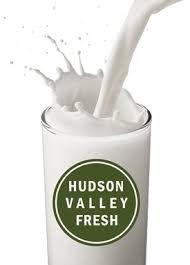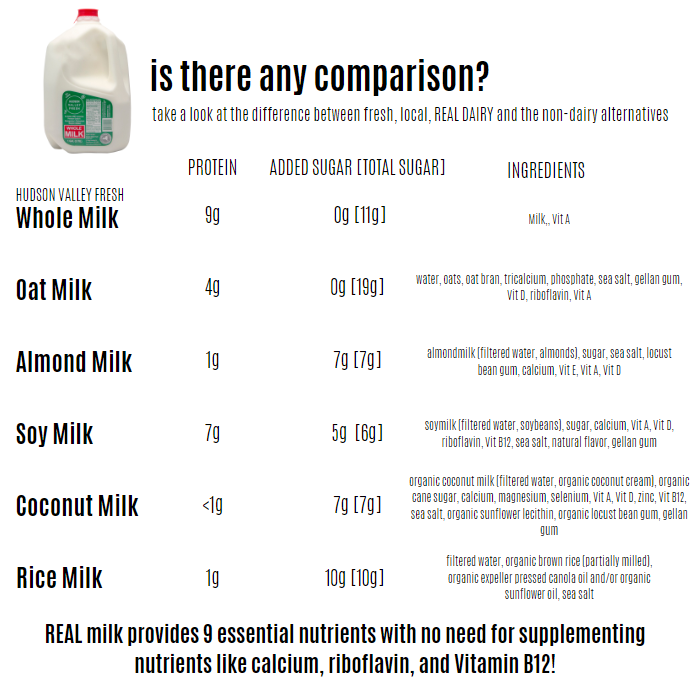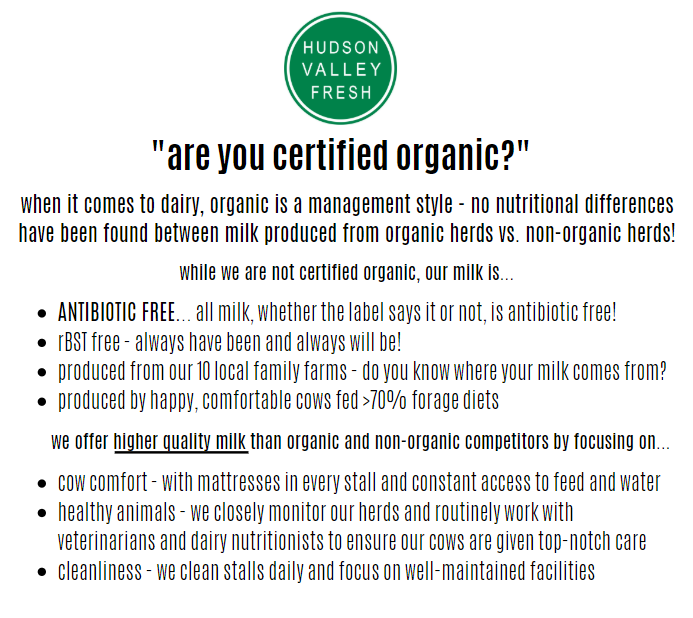How Do We Compare?

The Dairy Case Conundrum
Our Hudson Valley Fresh families are just like yours. Just like you, they work hard and live busy lives and at the end of the day want to provide safe, nutritious, high quality food for their families. With an ever-changing world and an abundance of marketing campaigns and labels upon labels, this can be a confusing and difficult task.
While we are extremely lucky to live in a society with so many food options, consumers often struggle with headlines screaming what’s “good” or “bad” and are often led to believe that alternatives are just-as-good as or equivalent to the real thing. When it comes to dairy, though, that’s just not the case.
Our founder, Dr. Sam Simon, grew up on a dairy farm. He went to medical school and spent decades as an orthopedic surgeon before he retired from his medical practice and returned to dairy farming. Throughout his career, he saw first-hand the positive impacts of consuming dairy in his patients.
We wanted to create this page as a resource for you – who cares about safely feeding your family wholesome, nutritious foods – to dive into the true differences between the extensive options of the dairy aisle, to bust some myths you may have heard about dairy, and to share links to other resources that might help answer your questions and better equip you to make the right decision for you and your family.
We aren’t medical professionals or registered dieticians – for specific dietary questions we recommend you reach out to those trained professionals. But we are farmers who believe in sharing peer reviewed research, who take on the role of feeding other and food safety very seriously, and who want to answer any questions you may have to the best of our ability – if you have any questions you find weren’t answered, reach out to us!
The Basics
Milk is defined as the product of mammals. If it is not produced by mammals such as a cow, goat, bison, or camel – it is not milk. What specific properties make milk so unique, aside from its origin? Nine essential nutrients – including protein, phosphorus, calcium, Vitamins A and D as well as B2 (riboflavin), B3 (niacin), B5 (pantothenic acid), and B12. Read more about the nine essential nutrients. Do we really need these nutrients? YES!
Of the nine, three of these nutrients make the list for most commonly underconsumed nutrients of public concern – calcium, Vitamin D, and potassium. You’ve probably heard a lot about the importance of calcium, about how it contributes most notably to strong bones and teeth. What you may not know is that in order to absorb calcium in your intestine, you need Vitamin D. Vitamin D is actually found in very few foods and many Americans are not consuming enough of it. Vitamin D is found however, in dairy products, namely whole milk, as it is a fat-soluble vitamin.
MOMS! A note about calcium
A diet supplying adequate calcium is important for men and women of all ages, but especially for children. Bone mass is built during youth and adolescent years. Later on in life, we need to continue to consume calcium to maintain bone strength and prevent illnesses such as osteoporosis, but there is nothing we can do to add to bone mass once we reach our peak bone mass at approximately age 25. Therefore calcium consumption in young children is not only important, but time sensitive. Learn more about the importance of calcium at every age.
Yes, you can get calcium from other sources, like spinach or kale. But as an example, you would need to consume 4 cups of cooked collard greens every single day and be actively aware of your Vitamin D to ensure you are absorbing the calcium your body requires.
Aside from being a nutrient dense package, research shows adult diets containing adequate levels of dairy yielded in reduced risk of cardiovascular disease, type 2 diabetes, and high blood pressure. This in part is why the Dietary Guidelines for Americans recommends three servings of REAL dairy daily.
What about the non-dairy in the dairy aisle?
Is there any comparison? Aside from the appearance and the marketing as something you pour over cereal, no – dairy alternatives are not nutritionally equivalent to real dairy. Hudson Valley Fresh whole milk contains the most grams of protein per cup with 0 grams of added sugar and by far, the shortest, most natural ingredients list when compared to some available alternatives.

Aside from nutritional differences, Hudson Valley Fresh offers 100% source-ability back to our ten family farms on all our dairy products. You always know where the product comes from and how the animals were treated. Our strict quality standards are un-matched by competitors and we have the annual milk quality awards to back it up – one of our farms is even top 6 in the entire country for milk quality! Being conscious of where the product is coming from is just as important as what you choose to put in your body, so get to know the farm families of Hudson Valley Fresh and be sure to follow along with us on social media.
What else does Hudson Valley Fresh whole milk offer? Check out our “Our Values” page!
Another question we frequently get – are you certified organic?

While we are not certified organic, our farmers are totally focused on cow comfort, cleanliness, and milk quality. The term “organic” has nothing to do with milk quality and our standards for quality are un-matched by competitors – be they organic or not! Furthermore, the term “organic” does not signify any nutritional differences, or mean that the milk comes from any certain size farm.
Busting other Dairy Myths:
- Nutritional differences have been found between organic milk and non-organic milk – FALSE! In dairy farming, “organic” is a management style, not an indicator of a nutritionally superiority.
- Unless milk is labeled organic, it contains antibiotics – FALSE! All milk, regardless of what the label says, is antibiotic free. It is illegal in this country to sell milk that contains antibiotics or drug residue.
- Consuming dairy is the cause of acne – FALSE! According to the American Academy of Dermatology, a balanced, nutrient rich diet is recommended.
Have other questions? Reach out to us! Email info@hudsonvalleyfresh.com


